GALLUP NEWS SERVICE
PRINCETON, NJ -- A new Gallup survey finds Massachusetts Sen. John Kerry enjoying a slight lead over President George W. Bush, while Bush's approval ratings remain relatively unchanged, but for the most part in negative territory. The president's continuing strength is in the public's perception of how well he is fighting the war on terrorism, while his performance ratings in other areas -- the economy, foreign affairs, the situation in Iraq, energy policy, and prescription drugs for older Americans -- all elicit higher disapproval than approval.
The poll, conducted June 3-6, overlapped news of former President Ronald Reagan's death. Some of the results reported here could be affected by this news.
The poll finds Kerry leading Bush in the presidential contest by 49% to 44% among registered voters, and 50% to 44% among likely voters.
| Presidential Election 2004: Bush vs. Kerry Trial Heat among registered voters |
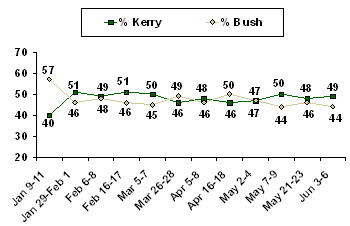 |
With independent Ralph Nader in the race, Kerry leads Bush by 45% to 42% among registered voters, with Nader receiving 7% support. Among likely voters, Kerry leads Bush by 49% to 43%, with Nader garnering 5% support.
| Presidential Election 2004: Bush vs. Kerry vs. Nader Trial Heat among registered voters |
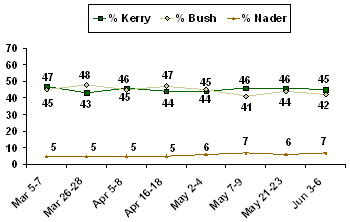 |
All the changes in voter preferences from the May 21-23 poll are within the polls' margins of error. These results suggest that the race remains close, though Kerry appears to have a slight edge at this time. This is, in fact, the largest lead Kerry has had over Bush among likely voters since early March.
Battleground States
Among registered voters, Kerry leads Bush by 20 points in the blue states (won by former Vice President Al Gore in 2000 by a margin of more than 5 percentage points), and trails Bush by just 4 points in the red states (won by Bush in 2000 by a margin of more than 5 percentage points). In the purple states (those won by either Gore or Bush by margins of 5 points or less), Kerry leads by 5 points, 49% to 44%.
| Presidential Election 2004: Trial Heats in Red, Blue, and Purple States among registered voters (Nader excluded) |
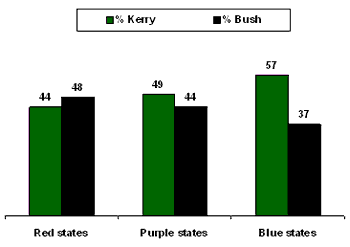 |
| June 3-6, 2004 |
With Nader in the race, the margins are less favorable to Kerry in all three groups of states. Kerry leads Bush by 15 points in the blue states, and trails Bush by 6 points in the red states. In the purple states, Kerry's lead is down to 45% to Bush's 43%, with Nader getting 7% support.
| Presidential Election 2004: Trial Heats in Red, Blue, and Purple States among registered voters (Nader included) |
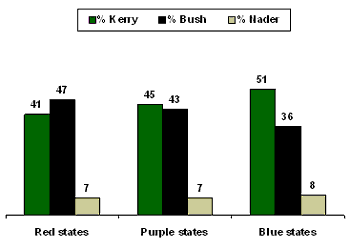 |
| June 3-6, 2004 |
Bush Approval
The poll shows an evenly divided public in evaluating Bush's overall job performance, with 49% who approve and 49% who disapprove. Bush's approval has ranged from 46% to 49% in the past four weeks, and has hovered around the 50% level for the past five months. Since the middle of January, Bush's approval has fluctuated only within a narrow range from a low of 46% to a high of 53%, the last time at the latter level at the end of March.
| George W. Bush’s Job Approval
Rating November 2003 -- Present |
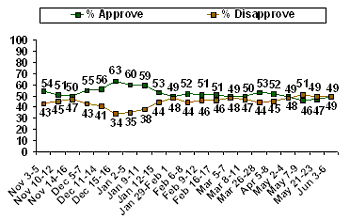 |
In the public's ratings of specific policy areas, the only one measured by Gallup where Bush receives majority approval is in his handling the war on terrorism -- 56% approve, while 43% disapprove. In all the other areas, majorities of Americans disapprove rather than approve.
| George W. Bush’s Approval
Ratings percentage approving of Bush’s handling of each issue |
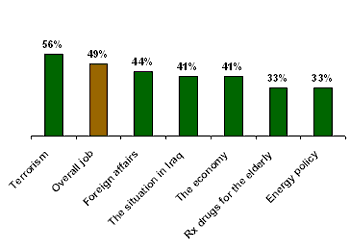 |
| June 3-6, 2004 |
The ratings show little change from those Bush received last month (energy and prescription drugs were not included in last month's poll), though they are considerably lower than the ratings Bush received last December/January before the start of the presidential campaign.
Of particular importance may be the low ratings Bush receives on two substantive issues -- prescription drugs for older Americans and energy policy. Gas prices have been a major concern for Americans in recent weeks, and only last week did senior citizens begin to feel the first impact of the new prescription drug law, enacted last fall. Neither of these areas would appear to be strengths for Bush, and may represent vulnerabilities that Kerry could take advantage of in the presidential campaign.
Survey Methods
Results are based on telephone interviews with 1,000 national adults, aged 18 and older, conducted June 3-6, 2004. For results based on the total sample of national adults, one can say with 95% confidence that the margin of sampling error is ±3 percentage points.
Results based on likely voters are based on the subsample of 599 survey respondents deemed most likely to vote in the November 2004 general election, according to a series of questions measuring current voting intentions and past voting behavior. For results based on the total sample of likely voters, one can say with 95% confidence that the margin of sampling error is ±4 percentage points. The likely voter model assumes a turnout of 50% of national adults, consistent with recent presidential elections. The likely voter sample is weighted down to match this assumption.
For results based on the sample of 896 registered voters, the maximum margin of sampling error is ±4 percentage points.
In addition to sampling error, question wording and practical difficulties in conducting surveys can introduce error or bias into the findings of public opinion polls.
2. If Massachusetts Senator John Kerry were the Democratic Party's candidate and George W. Bush were the Republican Party's candidate, who would you be more likely to vote for -- [ROTATED: John Kerry, the Democrat (or) George W. Bush, the Republican]?
2A. As of today, do you lean more toward -- [ROTATED: Kerry, the Democrat (or) Bush, the Republican]?
|
|
|
NEITHER (vol.) |
OTHER |
No |
|
|
% |
% |
% |
% |
% |
|
|
Likely Voters |
|||||
|
2003 Jun 3-6 |
50 |
44 |
2 |
1 |
3 |
|
2004 May 21-23 |
49 |
47 |
1 |
* |
3 |
|
2004 May 7-9 |
47 |
48 |
2 |
1 |
2 |
|
2004 May 2-4 |
49 |
48 |
1 |
* |
2 |
|
2004 Apr 16-18 |
46 |
51 |
2 |
* |
1 |
|
2004 Apr 5-8 |
45 |
48 |
4 |
1 |
2 |
|
2004 Mar 26-28 |
47 |
51 |
1 |
-- |
1 |
|
2004 Mar 5-7 |
52 |
44 |
2 |
1 |
1 |
|
2004 Feb 16-17 |
55 |
43 |
1 |
* |
1 |
|
2004 Feb 6-8 |
48 |
49 |
1 |
* |
2 |
|
2004 Jan 29-Feb 1 |
53 |
46 |
* |
-- |
1 |
|
2004 Jan 9-11 |
43 |
55 |
1 |
* |
1 |
|
Registered Voters |
|||||
|
2004 Jun 3-6 |
49 |
44 |
3 |
* |
4 |
|
2004 May 21-23 |
48 |
46 |
2 |
* |
4 |
|
2004 May 7-9 |
50 |
44 |
3 |
* |
3 |
|
2004 May 2-4 |
47 |
47 |
2 |
1 |
3 |
|
2004 Apr 16-18 |
46 |
50 |
2 |
* |
2 |
|
2004 Apr 5-8 |
48 |
46 |
3 |
1 |
3 |
|
2004 Mar 26-28 |
46 |
49 |
2 |
* |
3 |
|
2004 Mar 5-7 |
50 |
45 |
2 |
1 |
2 |
|
2004 Feb 16-17 |
51 |
46 |
2 |
* |
1 |
|
2004 Feb 6-8 |
49 |
48 |
1 |
* |
2 |
|
2004 Jan 29-Feb 1 |
51 |
46 |
1 |
-- |
2 |
|
2004 Jan 9-11 |
40 |
57 |
2 |
-- |
1 |
|
2003 Nov 10-12 |
46 |
52 |
1 |
-- |
1 |
|
2003 Sep 19-21 |
48 |
47 |
2 |
1 |
2 |
|
National Adults |
|||||
|
2004 Jun 3-6 |
48 |
44 |
4 |
* |
4 |
|
2004 May 21-23 |
48 |
44 |
4 |
* |
4 |
|
2004 May 7-9 |
51 |
43 |
3 |
* |
3 |
|
2004 May 2-4 |
47 |
46 |
3 |
1 |
3 |
|
2004 Apr 16-18 |
46 |
49 |
2 |
1 |
2 |
|
2004 Apr 5-8 |
46 |
47 |
3 |
1 |
3 |
|
2004 Mar 26-28 |
46 |
48 |
3 |
* |
3 |
|
2004 Mar 5-7 |
50 |
45 |
3 |
* |
2 |
|
2004 Feb 16-17 |
51 |
44 |
3 |
* |
2 |
|
2004 Feb 6-8 |
48 |
48 |
2 |
* |
2 |
|
2004 Jan 29-Feb 1 |
52 |
44 |
2 |
-- |
2 |
|
2004 Jan 9-11 |
40 |
57 |
2 |
-- |
1 |
|
2003 Nov 10-12 |
44 |
53 |
1 |
-- |
2 |
|
2003 Sep 19-21 |
47 |
48 |
2 |
1 |
2 |
|
(vol.) Volunteered response |
|||||
|
* Less than 0.5% |
|||||
3. Now suppose Ralph Nader runs as an independent candidate, who would you be most likely to vote for -- [ROTATED: Kerry, the Democrat, Bush, the Republican,(or) Nader, the independent]?
3A. As of today, do you lean more toward -- [ROTATED: Kerry, the Democrat, Bush, the Republican,(or) Nader, the independent]?
|
|
|
|
NONE (vol.) |
OTHER (vol.) |
No |
|
|
% |
% |
% |
% |
% |
% |
|
|
Likely Voters |
||||||
|
2004 Jun 3-6 |
49 |
43 |
5 |
* |
1 |
2 |
|
2004 May 21-23 |
47 |
46 |
4 |
1 |
* |
2 |
|
2004 May 7-9 |
45 |
47 |
5 |
2 |
-- |
1 |
|
2004 May 2-4 |
47 |
47 |
3 |
1 |
* |
2 |
|
2004 Apr 16-18 |
44 |
50 |
4 |
* |
* |
2 |
|
2004 Apr 5-8 |
43 |
47 |
4 |
2 |
1 |
3 |
|
2004 Mar 26-28 |
45 |
49 |
4 |
1 |
-- |
1 |
|
2004 Mar 5-7 |
50 |
44 |
2 |
1 |
1 |
2 |
|
Registered Voters |
||||||
|
2004 Jun 3-6 |
45 |
42 |
7 |
1 |
1 |
4 |
|
2004 May 21-23 |
46 |
44 |
6 |
1 |
* |
3 |
|
2004 May 7-9 |
46 |
41 |
7 |
3 |
* |
3 |
|
2004 May 2-4 |
44 |
45 |
6 |
1 |
1 |
3 |
|
2004 Apr 16-18 |
44 |
47 |
5 |
1 |
* |
3 |
|
2004 Apr 5-8 |
46 |
45 |
5 |
2 |
* |
2 |
|
2004 Mar 26-28 |
43 |
48 |
5 |
1 |
-- |
3 |
|
2004 Mar 5-7 |
47 |
45 |
5 |
1 |
* |
2 |
|
National Adults |
||||||
|
2004 Jun 3-6 |
44 |
42 |
8 |
2 |
1 |
3 |
|
2004 May 21-23 |
46 |
42 |
6 |
2 |
1 |
3 |
|
2004 May 7-9 |
46 |
41 |
8 |
3 |
* |
2 |
|
2004 May 2-4 |
44 |
44 |
7 |
1 |
1 |
3 |
|
2004 Apr 16-18 |
43 |
46 |
7 |
1 |
* |
3 |
|
2004 Apr 5-8 |
45 |
45 |
5 |
2 |
1 |
2 |
|
2004 Mar 26-28 |
44 |
46 |
7 |
1 |
-- |
2 |
|
2004 Mar 5-7 |
47 |
44 |
5 |
1 |
1 |
2 |
|
(vol.) Volunteered response |
||||||
|
* Less than 0.5% |
||||||
4. Do you approve or disapprove of the way George W. Bush is handling his job as president?
|
|
Dis-approve |
No |
||
|
% |
% |
% |
||
|
2004 Jun 3-6 |
49 |
49 |
2 |
|
|
2004 May 21-23 |
47 |
49 |
4 |
|
|
2004 May 7-9 |
46 |
51 |
3 |
|
|
2004 May 2-4 |
49 |
48 |
3 |
|
|
2004 Apr 16-18 |
52 |
45 |
3 |
|
|
2004 Apr 5-8 |
52 |
45 |
3 |
|
|
2004 Mar 26-28 |
53 |
44 |
3 |
|
|
2004 Mar 8-11 |
50 |
47 |
3 |
|
|
2004 Mar 5-7 |
49 |
48 |
3 |
|
|
2004 Feb 16-17 |
51 |
46 |
3 |
|
|
2004 Feb 9-12 |
51 |
46 |
3 |
|
|
2004 Feb 6-8 |
52 |
44 |
4 |
|
|
2004 Jan 29-Feb 1 |
49 |
48 |
3 |
|
|
2004 Jan 12-15 |
53 |
44 |
3 |
|
|
2004 Jan 9-11 |
59 |
38 |
3 |
|
|
2004 Jan 2-5 |
60 |
35 |
5 |
15. Do you approve or disapprove of the way George W. Bush is handling -- [RANDOM ORDER]?
A. The economy
|
|
Dis-approve |
No |
|
|
% |
% |
% |
|
|
2004 Jun 3-6 |
41 |
58 |
1 |
|
2004 May 7-9 ^ |
41 |
56 |
3 |
|
2004 May 2-4 |
41 |
56 |
3 |
|
2004 Apr 16-18 |
46 |
52 |
2 |
|
2004 Mar 26-28 |
42 |
55 |
3 |
|
2004 Feb 9-12 |
45 |
52 |
3 |
|
2004 Jan 29-Feb 1 |
43 |
54 |
3 |
|
2004 Jan 2-5 |
54 |
43 |
3 |
B. Foreign affairs
|
|
Dis-approve |
No |
|
|
% |
% |
% |
|
|
2004 Jun 3-6 |
44 |
54 |
2 |
|
2004 May 2-4 |
42 |
53 |
5 |
|
2004 Feb 9-12 |
46 |
52 |
2 |
|
2004 Jan 29-Feb 1 |
46 |
51 |
3 |
|
2004 Jan 2-5 |
58 |
39 |
3 |
C. The situation in Iraq
|
Approve |
Disapprove |
No opinion |
|
|
% |
% |
% |
|
|
2004 Jun 3-6 |
41 |
57 |
2 |
|
2004 May 7-9 ^ |
41 |
58 |
1 |
|
2004 May 2-4 |
42 |
55 |
3 |
|
2004 Apr 16-18 |
48 |
49 |
3 |
|
2004 Mar 26-28 |
51 |
47 |
2 |
|
2004 Jan 29-Feb 1 |
46 |
53 |
1 |
|
2004 Jan 2-5 |
61 |
36 |
3 |
|
2003 Dec 5-7 |
50 |
47 |
3 |
|
2003 Nov 3-5 |
45 |
54 |
1 |
|
2003 Oct 6-8 |
47 |
50 |
3 |
|
2003 Sep 8-10 |
51 |
47 |
2 |
|
2003 Aug 25-26 |
57 |
41 |
2 |
|
2003 Jul 25-27 |
60 |
38 |
2 |
|
2003 Jul 18-20 |
57 |
39 |
4 |
|
2003 Jul 7-9 |
58 |
39 |
3 |
|
2003 Jun 12-15 |
63 |
34 |
3 |
|
2003 Apr 14-16 |
76 |
21 |
3 |
|
2003 Mar 29-30 |
71 |
27 |
2 |
|
2003 Mar 24-25 |
71 |
26 |
3 |
|
2003 Mar 14-15 |
56 |
41 |
3 |
|
2003 Jan 31-Feb 2 |
54 |
42 |
4 |
|
2003 Jan 3-5 |
55 |
40 |
5 |
|
2002 Dec 9-10 |
55 |
39 |
6 |
|
2002 Oct 21-22 |
52 |
40 |
8 |
|
^ Asked of half sample. |
|||
D. Terrorism
|
Approve |
Disapprove |
No opinion |
||
|
% |
% |
% |
||
|
2004 Jun 3-6 |
56 |
43 |
1 |
|
|
2004 May 7-9 ^ |
54 |
43 |
3 |
|
|
2004 May 2-4 |
52 |
45 |
3 |
|
|
2004 Apr 16-18 |
60 |
39 |
1 |
|
|
2004 Mar 26-28 |
58 |
39 |
3 |
|
|
2003 Dec 5-7 |
65 |
33 |
2 |
|
|
2003 Sep 8-10 |
64 |
34 |
2 |
|
|
2003 Aug 25-26 |
66 |
31 |
3 |
|
|
2003 Jan 31-Feb 2 |
71 |
26 |
3 |
|
|
2002 May 20-22 ^ |
83 |
13 |
4 |
|
|
2002 Apr 5-7 ^ |
83 |
13 |
4 |
|
|
2002 Mar 20-22 † |
86 |
12 |
2 |
|
|
2001 Nov 2-4 † |
86 |
12 |
2 |
|
|
^ |
Asked of a half sample |
|||
|
† |
WORDING: U.S. military action abroad to fight terrorism. |
|||
|
‡ |
Alternate wording asked in Nov. 2-4 and Mar. 20-22 poll produced similar results; data presented are the average of two wordings: "efforts to prevent future acts of terrorism in the U.S." and "U.S. military action abroad to fight terrorism." |
|||
E. Energy policy
|
Approve |
Disapprove |
No opinion |
|
|
% |
% |
% |
|
|
2004 Jun 3-6 |
33 |
58 |
9 |
|
2003 Aug 25-26 |
47 |
44 |
9 |
|
2003 Jan 31-Feb 2 ^ |
54 |
34 |
12 |
|
2002 Mar 22-24 ^ † |
57 |
29 |
14 |
|
2001 Jul 10-11 ^ |
45 |
44 |
11 |
|
2001 May 18-20 ^ |
41 |
51 |
8 |
|
2001 Apr 20-22 ^ † |
43 |
45 |
12 |
|
^ WORDING: Energy |
|||
|
† Asked of half sample. |
|||
F. Prescription drugs for older Americans
|
Approve |
Disapprove |
No opinion |
|
|
% |
% |
% |
|
|
2004 Jun 3-6 |
33 |
58 |
9 |
|
2003 Dec 5-7 |
40 |
47 |
13 |
|
2001 Jul 10-11 |
52 |
28 |
20 |
SUMMARY TABLE: BUSH APPROVAL ON ISSUES
|
2004 Jun 3-6 (sorted by "approve") |
|
|
|
% |
% |
|
|
Terrorism |
56 |
43 |
|
Overall job approval |
49 |
49 |
|
Foreign affairs |
44 |
54 |
|
The situation in Iraq |
41 |
57 |
|
The economy |
41 |
58 |
|
Prescription drugs for older Americans |
33 |
58 |
|
Energy policy |
33 |
58 |
